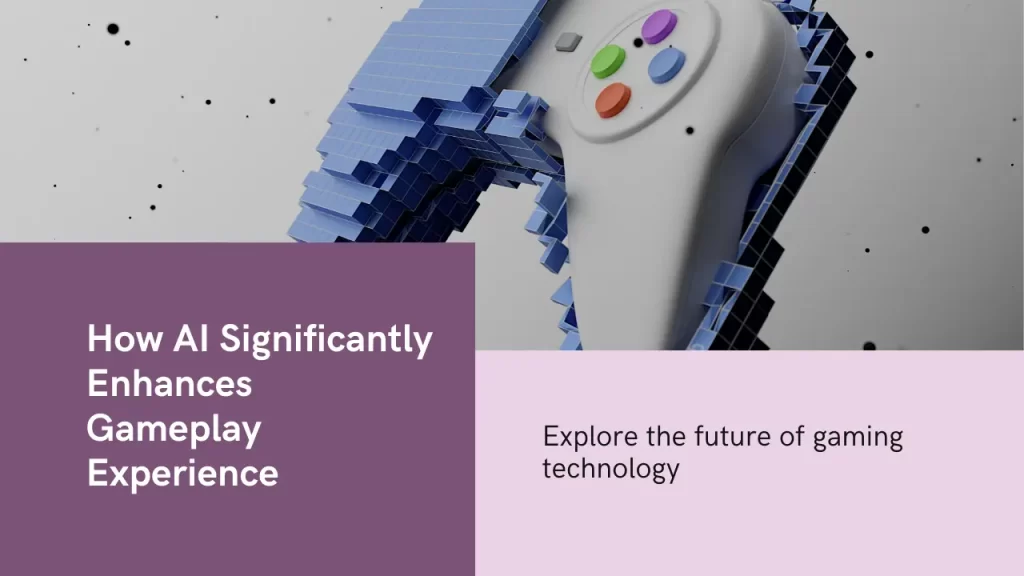The gaming industry has come a long way, from simple pixelated games to immersive, complex experiences. Today, artificial intelligence (AI) plays a crucial role in shaping the future of gaming. AI tools for gaming are not only enhancing the gaming experience for players but also transforming how games are developed, tested, and played. From creating smarter NPCs (non-playable characters) to optimizing game design, AI tools are becoming an integral part of the gaming ecosystem.
This article will explore how AI tools are revolutionizing gaming, the benefits they offer to both developers and players, and some of the key AI technologies driving innovation in the gaming industry.
Introduction to AI in Gaming
AI in gaming refers to the use of artificial intelligence technologies to enhance various aspects of game development and gameplay. From optimizing graphics and physics to generating realistic in-game behavior, AI is increasingly being used to create richer, more immersive gaming experiences. AI can simulate real-world environments, predict player behavior, and even create dynamic narratives, making games feel more responsive and interactive.
For developers, AI provides tools that streamline game development, improve testing, and automate repetitive tasks. For players, AI enhances the overall experience by creating more challenging and engaging gameplay.

How AI Improves Gameplay
AI tools for gaming are designed to enhance the overall gaming experience by offering smarter, more dynamic gameplay. Some key ways AI improves gameplay include:
- Adaptive Difficulty: AI can dynamically adjust the difficulty level based on the player’s skill. If a player is struggling, the AI can reduce the difficulty, and if the player is excelling, it can increase the challenge, ensuring the game remains engaging.
- Dynamic Storytelling: AI can create branching narratives that change based on player decisions, leading to multiple possible outcomes and replayability. This makes the story more personalized and responsive to the player’s actions.
- Smarter AI Opponents: With AI tools, NPCs can learn from the player’s actions and adapt their strategies. This creates more challenging enemies and allies, providing a more realistic and interactive experience.
AI Tools for Game Development
AI tools are also transforming the way games are developed. These tools are used in several aspects of game creation, from character design to world-building and optimization. Some popular AI tools used in game development include:
- Unity ML-Agents: Unity’s machine learning toolkit enables developers to create intelligent agents for their games. With Unity ML-Agents, developers can train AI agents to navigate virtual environments, learn from experience, and improve over time.
- Unreal Engine AI: Unreal Engine offers robust AI tools for game developers, including the ability to create NPCs with complex behaviors, pathfinding, and decision-making processes. Unreal’s AI system is used in numerous AAA games for creating intelligent, reactive characters.
- AI Dungeon: Using OpenAI’s GPT-3 technology, AI Dungeon allows players to experience procedurally generated text-based adventures. The game adapts to player inputs, creating unique experiences each time it is played.
AI in Game Testing and Quality Assurance
AI tools are revolutionizing game testing and quality assurance (QA) by automating the testing process. Traditional game testing involves manually playing through the game to identify bugs, glitches, and other issues. AI-driven testing tools can perform repetitive tests quickly and efficiently, ensuring the game is free of errors before release.
- AI-Driven Bug Detection: AI algorithms can automatically identify and report bugs based on specific patterns in game behavior. This helps developers find and fix issues much faster than manual testing.
- Automated Playthroughs: AI-powered bots can simulate thousands of playthroughs to identify inconsistencies, glitches, and balance issues that might be missed by human testers. These bots can even perform edge-case testing, simulating extreme player behaviors to ensure the game’s stability.
AI-Driven Personalization in Gaming
AI tools for gaming are making personalized experiences a reality. By analyzing player behavior, preferences, and choices, AI can tailor the gaming experience to each individual. Some examples of AI-driven personalization in gaming include:
- Personalized Recommendations: AI can recommend games based on a player’s interests, playstyle, and previous gaming history. This can help players discover new games and ensure that they enjoy content tailored to their preferences.
- Dynamic In-Game Content: AI can adapt in-game elements, such as quests, characters, and environments, to match a player’s choices, creating a more engaging and personalized experience.
- Player Behavior Analytics: AI tools can track and analyze player behavior to adjust gameplay elements. This includes modifying in-game economies, character abilities, and challenges based on how a player interacts with the game world.
The Role of AI in Creating Smarter NPCs
One of the most significant impacts AI has had on gaming is the creation of smarter NPCs (non-playable characters). In the past, NPCs followed basic scripts and behavior patterns, but AI tools now enable these characters to respond dynamically to player actions. Some examples include:
- Adaptive NPC Behavior: AI allows NPCs to learn from their interactions with the player. If an NPC is defeated multiple times by the player, it can adjust its strategy to become more challenging. Conversely, if the player is struggling, the NPC may offer help or lower the difficulty.
- Contextual Responses: AI tools can help NPCs provide more realistic and context-aware dialogue and actions, making the world feel more alive. NPCs can react to the player’s choices, creating a more immersive and dynamic gaming experience.
AI and Game Design: The Future of Immersive Worlds
AI is playing a pivotal role in the future of game design, enabling developers to create highly immersive, interactive worlds. AI-driven procedural generation techniques allow for vast, dynamic game worlds that can evolve over time, providing endless exploration opportunities for players.
- Procedural World Generation: AI can generate massive, open-world environments that feel unique with every playthrough. These worlds are shaped by algorithms that consider player choices, ensuring that each experience is fresh and unpredictable.
- Dynamic Storylines: AI is helping developers create dynamic storylines that evolve based on player choices. As players interact with the game world, their actions shape the direction of the narrative, leading to different outcomes.
Challenges and Ethical Considerations of AI in Gaming
While AI tools offer many benefits, they also raise important challenges and ethical considerations, such as:
- Bias and Fairness: AI systems can sometimes reflect biases present in the data they are trained on, leading to unfair gameplay experiences or unintended outcomes.
- Data Privacy: Many AI tools collect and analyze player data to personalize experiences. However, this raises concerns about data privacy and the ethical use of personal information.
- Job Displacement: The rise of AI-driven game development tools could lead to job displacement for some roles in the gaming industry, such as QA testers and level designers.
The Future of AI in Gaming
The future of AI in gaming is incredibly exciting. As AI technologies continue to evolve, they will enable developers to create even more immersive, personalized, and dynamic gaming experiences. From AI-driven game creation to deeper player immersion, the possibilities are endless.
As the gaming industry grows, we can expect AI tools to become more sophisticated, offering new ways to enhance gameplay, optimize game development, and create more complex and interactive virtual worlds.

AI-Enhanced Graphics and Animation in Gaming
AI is revolutionizing graphics and animation by creating more realistic, fluid, and dynamic visuals in games. With AI-powered tools, game developers can automate the creation of lifelike animations, optimize textures, and improve rendering times. AI helps simulate realistic environmental changes, lighting effects, and character movements, making games more visually immersive. These advancements also allow for more detailed and dynamic character models, providing a better overall visual experience for players.
Example: Tools like Nvidia’s DLSS (Deep Learning Super Sampling) leverage AI to upscale lower-resolution images, enhancing the visual quality and performance of games without requiring significant computational resources.
AI and Voice Recognition for Interactive Gaming
Voice recognition powered by AI is becoming an essential feature in modern gaming, allowing players to interact with games through voice commands and conversations. This technology enables players to control in-game actions, initiate dialogues, and engage with NPCs using natural speech. The integration of AI-driven voice recognition enhances the immersive experience and opens new possibilities for interactive storytelling.
Example: Games like Star Wars Jedi: Survivor and Mass Effect utilize voice-activated commands, allowing players to issue commands to characters or control game functions with their voice, offering a deeper level of interaction within the game world
Conclusion
AI tools for gaming are transforming how games are developed, tested, and played. From smarter NPCs to procedural world generation and personalized experiences, AI is enhancing the gaming industry in countless ways. As these tools evolve, they will continue to reshape the future of gaming, providing players with richer, more immersive experiences and empowering developers to push the boundaries of what’s possible in the virtual world.
FAQs on AI Tools for Gaming
Q1: How does AI improve gameplay?
AI adjusts difficulty, personalizes content, and creates smarter NPCs, offering a more dynamic and engaging experience.
Q2: Can AI create smarter NPCs?
Yes, AI allows NPCs to learn from player actions and adapt their behavior, making them more realistic.
Q3: What is procedural world generation?
AI generates unique, expansive game worlds, offering endless exploration and variety for players.
Q4: How does AI help in game development?
AI automates tasks like bug detection, NPC behavior, and world-building, streamlining the development process.
Q5: Are AI tools used for game testing?
Yes, AI automates playthroughs and bug detection, speeding up the testing process.
Q6: Can AI create dynamic storylines?
Yes, AI adapts the storyline based on player choices, increasing replayability and personalization.
Q7: What are the ethical concerns with AI in gaming?
Concerns include AI bias, data privacy, and job displacement in game development.
Q8: How does AI personalize the gaming experience?
AI analyzes player behavior to adjust difficulty, recommend content, and modify gameplay.
Q9: Can AI enhance graphics and animation?
Yes, AI optimizes rendering, textures, and animation, improving visual quality and performance.
Q10: How does AI help with voice recognition in games?
AI allows players to use voice commands to interact with games, enhancing the immersive experience.

